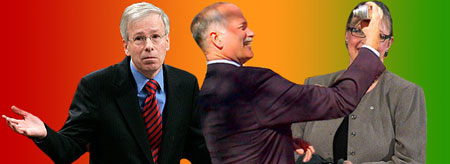Torontoist invited me to contribute to this year’s Heroes and Villains. Yesterday I shared my hero pick. Now here’s my villains submission.

Last year, Torontoist readers voted Stephen Harper, Jim Flaherty, et al. the number one villain of the year. Since then, their governance has gotten even worse. Even if you sympathize with the Harper government’s policy objectives, it’s hard to support the way they’ve gone about accomplishing them. Despite expressing respect for the will of Parliament while in opposition, Stephen Harper’s Conservatives have done everything they can to obstruct Parliament from functioning properly in a minority situation, to the point of breaking their own fixed election date law for pure political advantage. In other words, this government has given the opposition parties no shortage of fodder.
And yet that opposition has failed, repeatedly and consistently, to offer an alternative that catches the imagination of voters. The Liberal Party, for example, was specifically mocked for their reluctance to vote against the government (perhaps most memorably in a flashy Rick Mercer musical number). In the election that ultimately took place anyway the Liberals received their worst result in recent memory, while the New Democratic and Green parties also failed to make any significant inroads.
With such a vacuum of popular political options another smaller or newer political party might have found its niche (as Québec Solidaire recently did in the Quebec provincial election), but none of the nineteen registered Canadian political parties offered anything that caught the public’s attention.
This failure is mostly due to communication and political problems rather than policy ones. It’s not that the opposition parties haven’t had any good ideas—they have—but rather that they’ve been completely unsuccessful in communicating those ideas in a compelling way. This impotence was epitomized by the year-end coalition debacle, where the opposition leadership allowed perfectly legitimate and potentially exciting democratic cooperation to be successfully characterized by the prime minister as some kind of separatist coup.
As a result, the highly objectionable government of Stephen Harper has been allowed to continue to exist essentially without opposition. To be clear, only the Conservative government is responsible for their actions, but that doesn’t mean the opposition parties can be left off the hook for their failure to perform. No matter what party or ideology is in government, our democratic system relies on an effective opposition to function properly. Here’s hoping for better in 2009.
